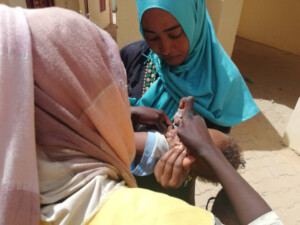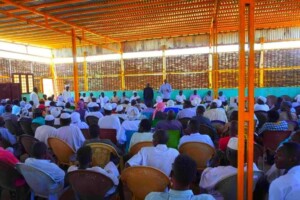‘Cholera at epidemic stage’: Sudan doctors, activists
Amid reports of hundreds of people who died from cholera in the past month, doctors and activists say the Sudanese government and international relief agencies are not giving the aid and attention needed.
Amid reports of hundreds of people who died from cholera in the past month, doctors and activists say the Sudanese government and international relief agencies are not giving the aid and attention needed.
The National Epidemiological Corporation reported the death of 820 people and the infection of more than 23,766 people with cholera since the start of May.
The newest report by the team of researchers, released on Sunday, recorded 192 new cases of cholera in White Nile state: in Kosti, Wedelkaki, Rabak, El Jebelein and El Duweim.
Reportedly 12 people died and 330 people were infected with cholera in both El Gedaref and Um Garkur refugee camps.
Three people died of cholera in Northern state and 23 others were infected with cholera in both El Bargeig and El Mahas areas. There were 20 new cholera patients recorded in Red Sea state hospitals.
On Sunday, five people died and ten others were infected with cholera at Kambo El Kamayin, in El Haji Abdallah which is in the south of El Gezira.
Health centre closed
In Khartoum, three people died at El Banjadeed Hospital, while in the entire state a total 249 cases were recorded in five hospitals. In Khartoum Bahri (North), the emergency room in El Ezba district witnessed the death of 17 patients starting two weeks ago. The number of infected cases has run-up to 250.
The security apparatus had closed a temporary cholera isolation centre which was established by the National Epidemiological Corporation in Bahri's El Ezba on Saturday. The Popular Congress Party (PCP), however, reopened it for people suffering from cholera on Sunday.
On Monday, an activist from the emergency room told Radio Dabanga that initiatives such as 'Your Health Concerns Us' and an initiative of the Sudanese Communist Party are raising public awareness about cholera. “Residents are asked to clean the environment, use garbage bags and provide equipment for spraying, pesticides, disinfectants and soap to the health centre,” she said.
“During the rainy season the epidemic may find its way to the conflict-ridden regions of the country such as Darfur, Blue Nile and the Nuba Mountains.”
The Darfur Relief and Documentation Centre (DRDC) stated on Monday that it believes Sudan is a cholera-endemic country “and all factors for a large-scale pandemic exist.
“The rainy season risks transforming the situation into a human tragedy of high proportion in case the epidemic finds its way to the conflict-ridden regions of the country such as Darfur, Blue Nile and the Nuba Mountains.” The population at risk is “considerable” because of poor access to clean water, food sources and optimal sanitation facilities, DRDC stressed.
WHO emergency plans
The DRDC lobbies for the World Health Organization (WHO) and other relief agencies to develop emergency plans with the Government of Sudan after it has declared the existence of cholera in the country and stopped with using ambiguous terms for the disease.
Acute watery diarrhoea is the adopted term for the disease by the Government of Sudan. In cooperation with the WHO it released an epidemiological bulletin this week stating there have been almost 15,000 suspected cases of acute watery diarrhoea, including 279 deaths, from mid-August 2016 to this month – compared to the 820 cholera victims who have died in May and June according to the doctors of the National Epidemiological Corporation.
The office of WHO Sudan has not replied to Radio Dabanga's latest request to comment on the spread of cholera in Sudan and Sudanese authorities refuse to make any reference to the disease being cholera.
Less than a month
A spokesman for the National Epidemiological Corporation, Dr Ali Bashir told Radio Dabanga that the cholera epidemic “will affect all the states of Sudan in a month and a half if the current situation is not responded to. The disease spread to ten states in less than a month.”
“People travel. This leads to the spread of the disease to eastern Sudan, northern Sudan, and North Kordofan. [Also] refugee camps in eastern Sudan are lacking the least services and suffering a terrible deterioration in the environment and water services amid a high density of population.”
Dr Bashir attributed the continued spread of cholera in White Nile and Khartoum to the “weakness of isolation and safety procedures, the deterioration of health services and poor health awareness of people”.









 and then
and then